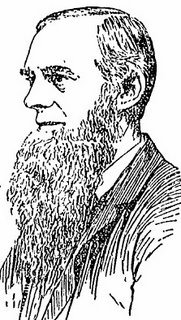Taking His Shot at Politics

Tintype innovator and America's first presidential nominee from a socialist party, Simon Wing, was born on this day in 1826 in St. Albans, Maine.
Simon Wing helped to popularize the tintype -- an inexpensive photographic process involving the making of pictures on enamelled iron which was introduced by Adolphe Alexandre Martin in 1853 -- by opening studios across the country and inventing new cameras. Starting as a daguerrotypist in Waterville, Maine when he was 20, Wing patented the earliest "multiplying camera" (which Wing dubbed the "Gem Camera") in 1860, by which he was capable of making as many as 616 half-inch square images on a single iron plate using multiple lenses. By the 1870s, Wing had opened tintype studios in Boston, Detroit, Toledo and as far west as Sacramento and San Francisco, making affordable photography available to the working class of America for the first time in history, and continued to patent improvements to his cameras. In his Boston shop, he made tintypes of each member of the Massachusetts legislature, and a small group of Boston politicians loved to frequent his establishment.
Perhaps as an extension of Wing's interest in both his working class clientele and the theater of politics (or maybe it was just pure political altruism), the retail photography magnate joined America's first socialist political party, the Socialist Labor Party -- led in the 1890s by militant Marxist theorist Daniel DeLeon, with the goal of converting the American Federation of Labor and other unions to its ranks. Although it was clear that Wing was a mere dilettante in the cause of socialism, at the nominating convention in New York City in 1892, Wing was nominated as the Party's first presidential candidate, with electrician Charles Matchett as his running mate. DeLeon himself later remarked that Wing's principal qualification for being nominated was that he resembled "Uncle Sam."
Wing placed last among party-supported candidates in the November election with 21,164 votes, behind Democrat Grover Cleveland (the winner, with 5,556,918 votes), Republican Benjamin Harrison (the losing incumbent, with 5,176,108 votes), Populist James B. Weaver (1,041,028) and Prohibitionist John Bidwell (264,133).
Although he served for a time as treasurer of the Boston section of the Socialist Labor Party, after 1892 Simon Wing was not a factor in party politics. He died December 17, 1916 in Charlestown, Massachusetts.
Categories: American-Socialists, Presidential-Campaigns, Photography





0 Comments:
Post a Comment
Subscribe to Post Comments [Atom]
<< Home